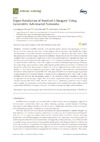Identificador persistente para citar o vincular este elemento:
https://accedacris.ulpgc.es/jspui/handle/10553/75355
| Título: | Super-resolution of Sentinel-2 imagery using generative adversarial networks | Autores/as: | Romero, Luis Salgueiro Marcello, Javier Vilaplana, Verónica |
Clasificación UNESCO: | 250616 Teledetección (Geología) | Palabras clave: | Deep Learning Generative Adversarial Network Sentinel-2 Super-Resolution Worldview |
Fecha de publicación: | 2020 | Publicación seriada: | Remote Sensing | Resumen: | Sentinel-2 satellites provide multi-spectral optical remote sensing images with four bands at 10 m of spatial resolution. These images, due to the open data distribution policy, are becoming an important resource for several applications. However, for small scale studies, the spatial detail of these images might not be sufficient. On the other hand, WorldView commercial satellites offer multi-spectral images with a very high spatial resolution, typically less than 2 m, but their use can be impractical for large areas or multi-temporal analysis due to their high cost. To exploit the free availability of Sentinel imagery, it is worth considering deep learning techniques for single-image super-resolution tasks, allowing the spatial enhancement of low-resolution (LR) images by recovering high-frequency details to produce high-resolution (HR) super-resolved images. In this work, we implement and train a model based on the Enhanced Super-Resolution Generative Adversarial Network (ESRGAN) with pairs of WorldView-Sentinel images to generate a super-resolved multispectral Sentinel-2 output with a scaling factor of 5. Our model, named RS-ESRGAN, removes the upsampling layers of the network to make it feasible to train with co-registered remote sensing images. Results obtained outperform state-of-the-art models using standard metrics like PSNR, SSIM, ERGAS, SAM and CC. Moreover, qualitative visual analysis shows spatial improvements as well as the preservation of the spectral information, allowing the super-resolved Sentinel-2 imagery to be used in studies requiring very high spatial resolution. | URI: | https://accedacris.ulpgc.es/handle/10553/75355 | ISSN: | 2072-4292 | DOI: | 10.3390/RS12152424 | Fuente: | Remote Sensing[EISSN 2072-4292],v. 12 (15), (Agosto 2020) |
| Colección: | Artículos |
Citas SCOPUSTM
78
actualizado el 08-jun-2025
Citas de WEB OF SCIENCETM
Citations
90
actualizado el 22-feb-2026
Visitas 10
161
actualizado el 10-ene-2026
Descargas
141
actualizado el 10-ene-2026
Google ScholarTM
Verifica
Altmetric
Comparte
Exporta metadatos
Los elementos en ULPGC accedaCRIS están protegidos por derechos de autor con todos los derechos reservados, a menos que se indique lo contrario.
